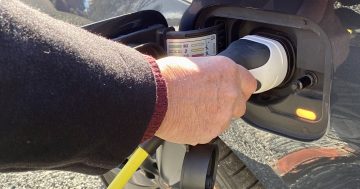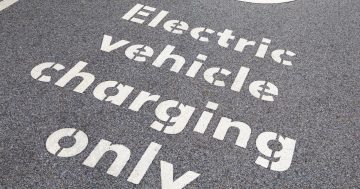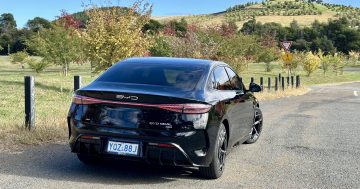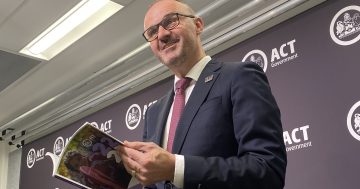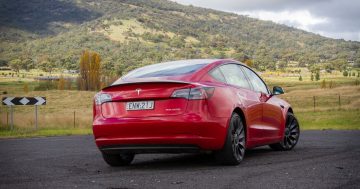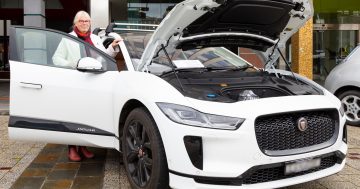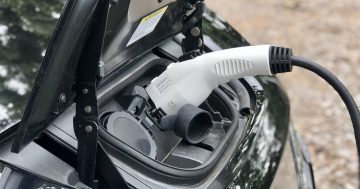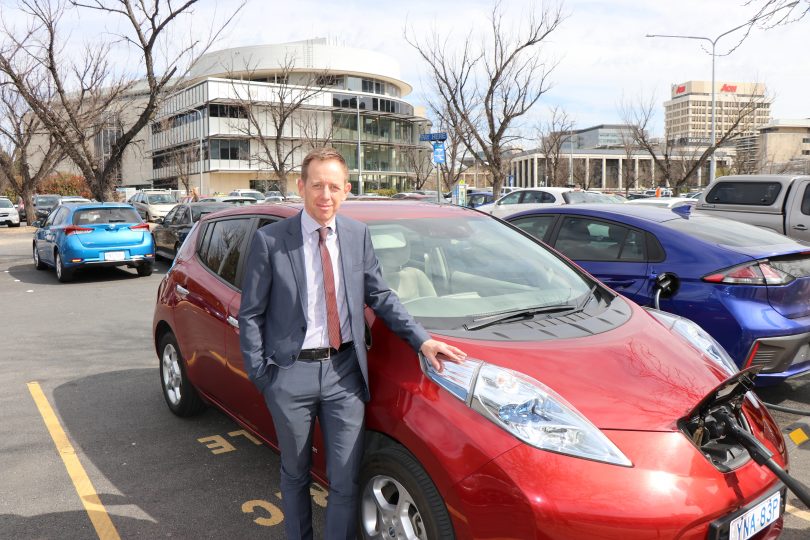
ACT Greens leader Shane Rattenbury with a charging electric vehicle. The Greens wanted subsidies for new EV buyers. Photo: File.
Chief Minister and Treasurer Andrew Barr has ruled out a specific tax on electric vehicles but that doesn’t mean EV drivers will get a free ride when it comes to maintaining the ACT’s roads.
Both South Australia and Victoria have decided to impose a road user charge on electric vehicles. Victoria plans to impose a 2.5 cent a kilometre charge on EVs and a 2c/km charge on plug-in hybrid cars from next July, while SA is yet to announce a rate.
Mr Barr said all states and territories would move to some form of road user charge over the next decade, likely replacing the combination of flat fee registration charges and fuel excise, as it declines with the increasing number of EVs on the road.
But he rebuffed suggestions that the Commonwealth, which is responsible for the fuel excise that contributes to road upkeep through consolidated revenue, should administer any road user charge so it would be uniform across Australia.
”The Commonwealth has no useful role to play here,” he said. “If implemented correctly, road user charging models can correct vertical fiscal imbalances while supporting the uptake of EVs and providing more sophisticated systems to support the management of costs for registration.
”This will also ensure that revenue raised locally will be retained locally. If the Commonwealth become involved then it is certain that revenue will be bled from the ACT to other jurisdictions.”
Mr Barr said any road user charging measures considered in the ACT in the next four years would be voluntary for vehicle owners and not be limited to electric vehicles.
”That is, it would be opt-in, open to all vehicles and designed to incentivise less driving, saving households money and reducing congestion on our roads,” he said.
”For instance, if the driver is a minimal road user, they may opt for a per kilometre or block kilometre charge that is less than the amount they would otherwise pay on the flat registration fee.”
Climate change and EV activists say the Victorian and SA moves will deter drivers from buying electric cars and slow the transition to non-carbon transport, which is crucial to those states meeting their goal of zero net emissions by 2050.
Mr Barr said the ACT Government, which has a 2040 emissions target, was committed to encouraging the uptake of electric vehicles.
”This is an industry that we want to see thrive and we know is critical in our action on climate change,” he said. ”We have announced an extensive support package for EV uptake and offer the greatest incentives anywhere in Australia.”
He said EV buyers did not pay stamp duty, and from next financial year, all new purchases of EVs would receive free registration for two years, while interest-free loans would be available in the next year to support people who wanted to buy an EV.
”We are also delivering more EV charging stations, and enacting regulation to future proof new constructions with built-in charging infrastructure while investigating measures to retrofit existing buildings,” he said.
Mr Barr said that next year after consultation with the EV industry, the ACT would set an ambitious target for EV new vehicle sales in the ACT by 2030, becoming the first jurisdiction in the country to do so.
He said Australia did not make cars so the market would be determined by decisions of international governments and manufacturers.
”EVs are coming fast and, at some point in the not too distant future, manufacturers will no longer make internal combustion engine vehicles,” he said.
”Technological improvements and scale of production increases over the next few years will continue to see the price of EVs fall so they provide a competitive market alternative – our incentives are designed to accelerate that uptake,” he said.
The ACT’s incentives would have been even more ambitious had the ACT Greens had things all their way in Parliamentary Agreement negotiations with Labor.
They wanted a $10,000 subsidy for buyers of new EVs.












